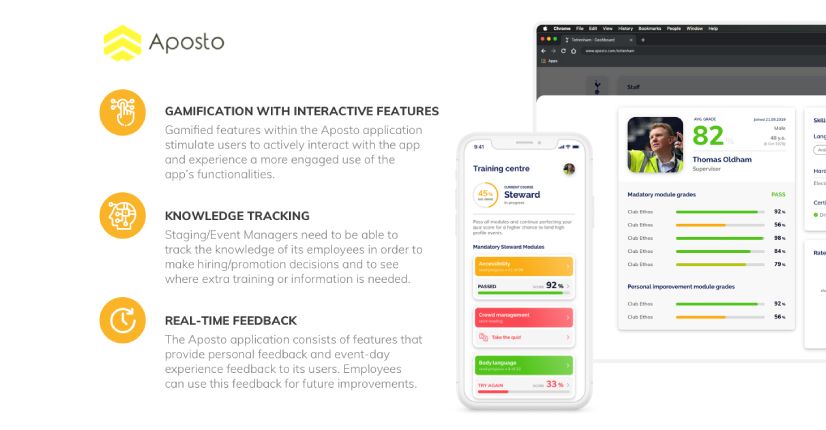Digital Transformations in the Sports Industry
Get the latest updates about our blog posts.
Subscribe so you don’t miss out!
We believe in the fact that any industry can benefit from the power of technology. And with more than 20 different industries in our portfolio, we can proudly say that we’ve become experts in guiding more than 70 clients active in various markets in their journey towards the digital transformation of their business. In our blog series about the digital transformation of different industries, we highlight the most important technological changes within a specific sector. This week, we dive into the sports industry and its struggles and victories that digitization brought along.
The rise of technologies in sports
The sports industry has always had tight connections to the offline world. After all, sports is about real life movement, right? With the emergence of technology, however, the sports industry has changed in many ways. Although sports in general are still taking place in real life, many other aspects of the industry have experienced a major digital transformation. That’s because a large part of the sports industry falls under the category of entertainment. The entertainment sector has seen a major shift from the offline to online spheres, with the the 1936 Summer Olympics as the first live televised sporting event in history. That’s almost a hundred years ago! Fast forward to today, we can watch almost any sports event at any place in the world on any device, whenever we want. And although that sounds great on paper, it does bring some challenges along with it.
Live streaming
The sports industry is an industry about engagement and community. People who are involved in sports or a specific sports event are usually quite passionate about it. Think of the tens of thousands of people that still completely fill up football stadiums, especially during important events like the FIFA World Cup. Even though we can livestream it for free from the comfort of our own couch, many people still choose to go to live matches. That’s something you’ll probably understand if you’ve ever visited a sporting event you’re passionate about in real life. It’s an entirely different and almost magical experience. However, because live streaming is becoming more advanced and with that more engaging, there is an obvious decline in the number of people that still attend live sporting events.
This has become a challenge for institutions and organizations that normally make a lot of profit from these live games. In order to bring supporters back into the stadium, and keep them engaged and coming back, they’ll need to start embracing the power of technology. Many sports fans are looking for more than just the game; they want exclusive and engaging experiences throughout the match and during pauses in play that technology can provide. By using immersive technologies like augmented and virtual reality to offer an incredibly engaging experience, sports companies could greatly increase stadium attendance and make sure that in-person fans keep returning. They could also boost engagement by tailoring experiences to individual fan preferences using loyalty & reward programs and implementing customer relationship management (CRM) systems.
There is a lot of investment being done by the NFL (American football) to keep in-person fans engaged. American football is defined by short, 10-15 second plays followed by a minute or so of inaction. TV and Streaming events keep fans engaged by providing statistics, entertainment, replays, etc. In-person fans don''t get that experience and many football teams are working hard to create apps and other technologies to keep fans entertained between plays so that they feel like coming back to the games over and over.
E-sports
Ever heard of E-sports? E-sport stands for “electronic sports” and forms a side branch of the sports industry, revolving around video game competitions and highly acclaimed championships. Over the past ten years, the E-sports sector has grown out to become a billion dollar industry, which is only growing with new technological advancements like virtual reality gaming and ever-evolving multiplayer potential. In popular online games like Fortnite, League of Legends, Counter-Strike, Call of Duty, and Overwatch, players from different leagues or teams compete against each other for the top spots and win prizes that can easily top several hundred thousand euros or more. Millions of fans watch and follow these gamers from all around the world either through live attendance, TV, or online. A lot of viewers watch their favorite gamers play on popular streaming platforms like Twitch or YouTube, and this is often where popular players grow their fan bases.

Digital gyms
Because of the corona crisis and worldwide lockdowns during the past one and a half years, gyms all over the world closed their doors. While for some people that decision came as a blessing, people who wanted to continue their health journey suddenly lost their resources and had to find an alternative to avoid losing progress. Because of this, many gym chains provided their loyal customers with in-app workout instruction videos for free. For people who weren’t signed up at a gym, there is a massive collection of instructional videos available online, from yoga classes to 10-minute HIIT workouts. This way, we can simply flip open our laptops, surf to YouTube or open an app on our phones and finish an entire workout during our lunch break without having to leave the house.
Event management
As mentioned before, the sports industry is closely connected to the entertainment industry. And while the attendance of live sporting events is clearly declining in large part due to the emergence of live streaming and the COVID-19 pandemic, real life sport events are unlikely to die out entirely thanks to the unique and engaging experience they provide for fans. That doesn’t mean that live sport events will refrain from joining the trend of digital transformation. On the contrary, more and more events are organized with significant help from technology, and not only in the sports industry. By automating processes and providing online environments in which event managers, planners, and coordinators can easily obtain insights in their employees and visitors, the experience of live sports events can be greatly enhanced. We’ve already seen the usefulness of technology at sports events during the corona crisis. For example, while COVID-19 vaccination percentages are rising, we can now return to the stadium by scanning a QR code that confirms a vaccination or recovery certificate. This way, event managers can make sure the event is safe, and allow more visitors to attend the event.
Project: Aposto
Aposto is a startup dedicated to improving the onboarding, briefing, and knowledge transfer of critical safety and event information from the event/location to the employee. The founder of Aposto was the Access and Experience Strategic Lead at Tottenham Hotspur Stadium. She also spent 15 years as the Premier League's Head of Fan Experience. Her firsthand experience with the frustrations and gaps that temporary staff have when onboarding for an event or match day prompted her to explore a digital solution.

Staging/Event Managers can use the Aposto app to clearly identify, disseminate, and manage key knowledge and information that has to be imparted to staff. The outcomes can help managers make hiring, promotion, and staffing decisions by tracking the knowledge employees have gained and making sure that employees are prepared for their tasks on a match day. Employees can use the platform to better understand their duties, key information, match-day schedules, and clearly understand what is expected of them. Additionally at the end of the day, the employee can also provide useful feedback on their event-day experiences, allowing them to feel more confident and capable of assisting visitors.
Want to know more about our partnership with Aposto? Check out the case study here!
Digitally transform with Lizard Global
Undertaking the digital transformation journey requires a thorough understanding of your business’ competencies as well as a vision for the future that will decide how internal processes, your organizational structure, and adopted technologies will need to evolve. As sports organizations grow accustomed to operating as digital businesses, they will not only become more connected to their fans, but they will also be able to develop more inventive and personalized experiences that will widen and enhance their client base.
No matter what industry you’re active in, we believe that technology can help any business in growing a bigger and more loyal customer base. As the step towards a digital transformation can be challenging, we gladly guide you through the process. Not only do our experts know exactly what technologies are suited for the digital transformation of your business and its unique character, they can also make and implement your solution in such a way that it’s scalable and ready for a future of growth and success.
Are you still looking for a digital partner for the development of your application, and are you ready to take the step towards the digital transformation of your own business? We can help! Get in touch with our experts by filling out the contact form on our website, or drop us a line on WhatsApp or our social media channels.
Curious about our other verticals? Check out our portfolio for an insight into all the industries we’re supporting with digital solutions. Or take a look at our previous blogs on the digital transformation in:
Maritime
Healthcare
FinTech
Human Resources
Education
Community
Transport & logistics
Industry 4.0
Real Estate




